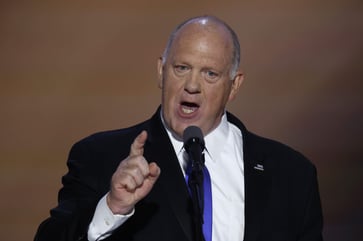A Syrian rebel victory could pose a 'wildly complex' national security threat, experts caution, as they express uncertainty about the potential consequences.
A power vacuum could attract terrorists, cautioned former CIA Station Chief Dan Hoffman.

After the Islamist rebels overthrew the Assad regime and seized control of Damascus, the future of Syria remains uncertain.
On Sunday, foreign policy experts and officials discussed the potential consequences for the Middle East nation and American forces stationed there following the breaking news.
What will happen next is uncertain, former Deputy National Security Adviser K.T. McFarland stated.
McFarland discussed the unrest on "Fox & Friends Weekend," stating that the change presents an uncertain picture, like others.

Assad was weak and incompetent, and was supported in governance in Syria by Iran and Russia, with Russian forces, military equipment, and Iranian money. However, both countries are now preoccupied with their own issues - Iran with Israel's actions against it and Hezbollah, and Russia with Ukraine and a struggling economy. As a result, their support for Assad has waned.
"However, the rebel groups united and seized the opportunity to enter Syria. President Trump is correct in stating, 'let it play out. This is not our fight.' I regret the presence of the 900 American forces in that country, as their role and safety are uncertain. Who knows if they are sitting targets or potential hostages?"

On Sunday, Sen. Marsha Blackburn, R-Tenn., issued a warning and expressed worry.
"We must recognize that there are no innocent parties in this conflict. The rebels have ties to al-Qaeda. We are aware that Iran will lose its supply lines to Hezbollah. Russia is losing access to a warm weather port, and we must ensure that we back Israel," she stated.
The former CIA station chief, Dan Hoffman, stated that the upcoming development poses a "complicated challenge" to U.S. national security, which the Trump administration will face when the president-elect assumes office next month.
The concern is that terrorists may take advantage of the potential power vacuum in Syria, as seen in Iraq and Libya.
"The challenge lies in gaining international consensus on the way forward, as Russia and Iran, former allies of Syria, are not likely to support our efforts to solve the problem. Additionally, Russia has a naval base in Tartus, which poses a significant challenge for us."

After the news broke, Donald Trump, the president-elect, posted on Truth Social.
"Assad has fled his country as Russia, led by Vladimir Putin, no longer wished to protect him. There was no reason for Russia to be in Syria in the first place, as they lost all interest in the country due to the ongoing conflict in Ukraine, where nearly 600,000 Russian soldiers were wounded or dead."
"Both Russia and Iran are currently weakened due to their respective conflicts with Ukraine and Israel. Zelenskyy and Ukraine are eager to end the madness and make a deal, having lost an estimated 400,000 soldiers and countless civilians. An immediate ceasefire is necessary, and negotiations should begin promptly."

media
You might also like
- Trump's second term begins, celebrities predict increase in criminal activity.
- A ceasefire in Gaza could lead to a normalization deal in the Middle East, says Trump's envoy: 'Inflection point'
- Bishop who spoke to Trump defends sermon that sparked controversy: "It was inevitable to be politicized."
- Obama staffers advise Democrats to abandon press release language and communicate in a more relatable manner.
- Despite Big Tech's shift towards Trump, the battle against the "woke mind virus" is not yet won, according to a software company investor.



















